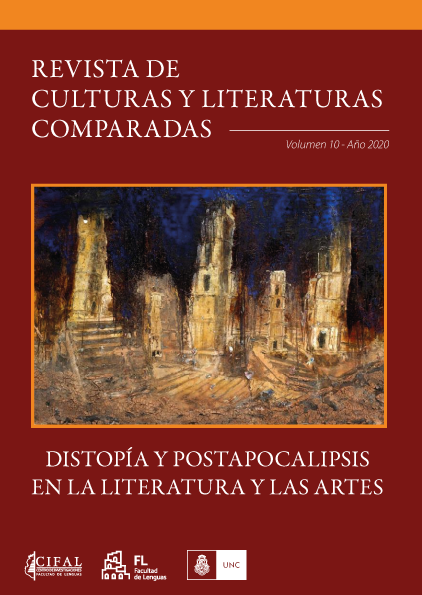The Impossible Post-apocalypse:Trauma and Style in Louis Ferdinand Céline's From One Castle to the Other and in Thomas Bernhard's The Origin
Keywords:
trauma, style, post-apocalypseAbstract
Published almost ten years apart, the novels D’un château l’autre, by Louis Ferdinand Céline, and Die Ursache, by Thomas Bernhard, narrate events that occurred at the same historical moment: the end of World War II. The traumatic experience of the bombings engenders in the narrators a horrified and fascinated vision at the same time, and the destruction thus begins to be perceived as an aesthetic fact. This paper intends to study how trauma appears as a decisive factor in the configuration of Céline and Bernhard's style, based on the aforementioned works. For this, elements such as the relationship between reality and language, the rhythm and structure of prose, misanthropy, the place of writing, temporal conceptions, etc. will be analyzed. The presence of trauma hinders any possibility of post-apocalyptic space, because the present and the future disarticulate before the great weight of the past.
Downloads
References
Barth, Markus. Lebenskunst im Alltag. Analyse der Werke von Peter Handke, Thomas Bernhard und Brigitte Kronauer. Wiesbaden: Springer Fachmedien, 1998.
Bernhard, Thomas. Relatos autobiográficos. Barcelona: Anagrama, 2013.
Bernstein, Michael André. Bitter Carnival. Ressentiment and the Abject Hero. New Jersey: Princeton University Press, 1992.
Cantagrel, Lucien. De la maladie à l’écriture. Tübingen: Max Niemeyer Verlag, 2004.
Céline, Louis Ferdinand. De un castillo a otro. Barcelona: Bruguera, 1981.
---. Conversaciones con el professor Y. Buenos Aires: Caja Negra, 2011.
Krättli, Anton. Eine Algebra des Untergangs: über Thomas Bernhard, Die Ursache und Korrektur. Schweizer Monatshefte: Zeitschrift für Politik, Wirttschaft, Kultur, Band 55, Heft 10 (1976): 817-825.
Kristeva, Julia. Pouvoirs de l’horreur. París: Editions du Seuil, 1980.
La Capra, Dominick. Estudios del trauma: sus críticas y vicisitudes. Historia en tránsito. Experiencia, identidad, teoría crítica. Buenos Aires: Fondo de Cultura Económico, 2006. 147-195.
Leys, Ruth. Trauma. A Genealogy. The University of Chicago Press, 2000.
Lorenz, Dagmar. The established outsider: Thomas Bernhard. Matthias Konzett (Ed.). Companion to the works of Thomas Bernhard. New York: Camden House, 2002.
Marquardt, Eva. Gegenrichtung: Entwicklungstendenzen in der Erzählprosa Thomas Bernhards. Tübingen: Niemeyer Verlag, 1990.
Marten, Catherine. BernhardsBaukasten. Schrift und sequenziellePoetik in Thomas BernhardsProsa. Berlin: De Gruyter, 2018.
Meffre, Gislhaine. El inverosímil fascismo de Céline. Julia Kristeva (Ed.). Loca verdad: verdad y verosimilitud del texto psicótico. Madrid: Fundamentos, 2012.
Noble, Ian. Language and Narration in Céline’s Writings. Londres: The MacMillan Press, 1987.
Sanfelippo, Luis. Trauma: un estudio histórico en torno a Sigmund Freud. Buenos Aires: Miño y Dávila, 2018.
Sebald, W. G. Pútrida patria. Barcelona: Anagrama, 2005.
---. Sobre la historia natural de la destrucción. Buenos Aires: Editorial La Página, 2010.
Sollers, Philippe. Céline. Buenos Aires: Paradiso, 2012.
Thiher, Allen. Céline: The Novel as Delirium. New Jersey: Rutgers University Press, 1972.
Wilms, Wilfried. Speak no Evil, Write no Evil. In Search of a Usable Language of Destruction. Scott Denham y MarkMcCulloh (Ed.).W. G. Sebald. History-Memory-Trauma. De Gruyter: Berlín, 2006.183-205.
Zangl, Veronika. Poetiknach dem Holocaust. München: Wilkelm Fink Verlag, 2009.
Downloads
Published
Issue
Section
License

This work is licensed under a Creative Commons Attribution-NonCommercial-NoDerivatives 4.0 International License.
Aquellos/as autores/as que tengan publicaciones con esta revista, aceptan los términos siguientes:
a) Los/as autores/as conservarán sus derechos de autor y garantizarán a la revista el derecho de primera publicación de su obra, el cual estará simultáneamente sujeto a la Licencia de reconocimiento de Creative Commons.
b) La cesión de derechos no exclusivos implica que la publicación de los artículos en la presente revista no quita la posibilidad o el derecho al autor/a de publicar su obra de manera posterior en otras revistas u órganos editoriales y la autorización por parte de los/as autores/as para que el trabajo sea depositado en los repositorios institucionales, tales como el Portal de Revistas de la Universidad Nacional de Córdoba.



